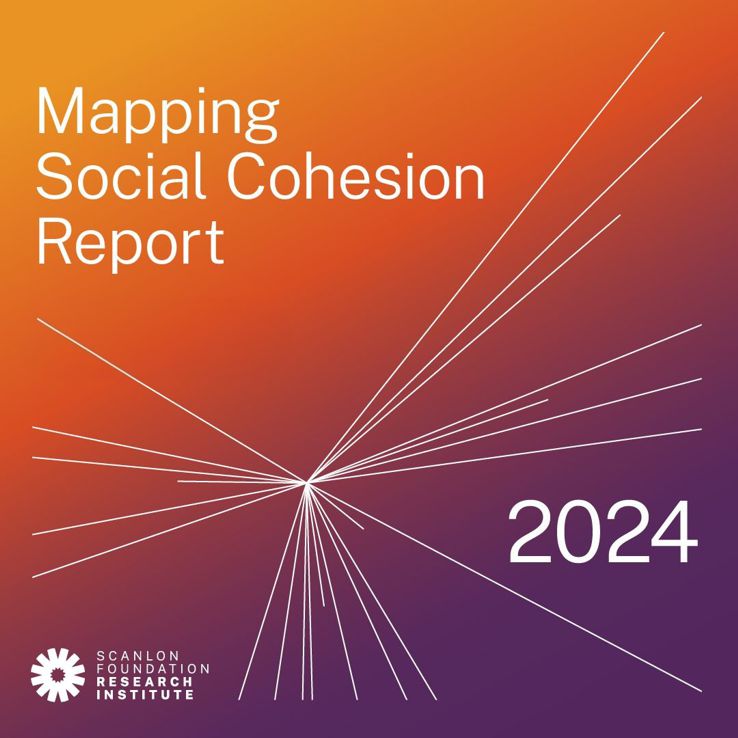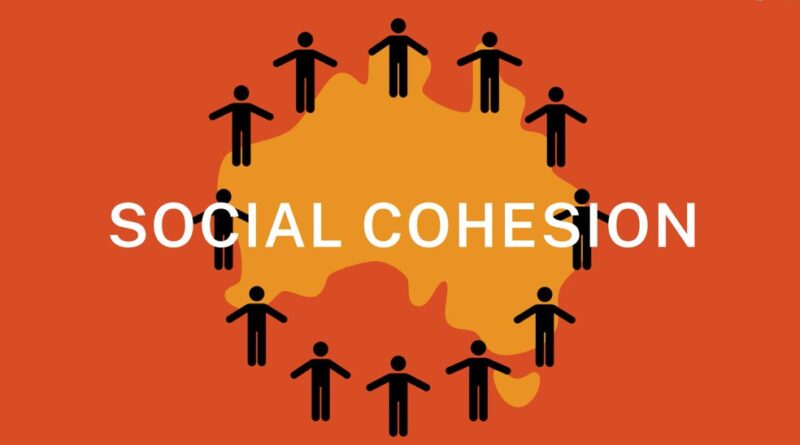New report: Australia’s social cohesion holds steady but faces strain amid persistent cost-of-living pressures and a challenging global environment
MEDIA RELEASE
Since 2007, the Scanlon Mapping Social Cohesion Research series has tracked Australians’ views on key social cohesion issues, including trust, immigration, democracy, and globalisation.

The 2024 report, released on Tuesday, presents insights from a survey of more than 8,000 participants, and more than 100 questions exploring the challenges and strengths that shape the nation’s social fabric. It finds that while social cohesion has remained stable over the past 12 months, key areas of concern for Australians in 2024 include the economy, housing, immigration and safety.
Report author Dr James O’Donnell, from the Australian National University, said that while global and local challenges have put Australia’s social cohesion under strain, it has not cracked.
“In a world grappling with conflict and division, our social cohesion is under pressure but holding steady. While there has been decline in key areas like trust and sense of safety, and financial stress remains a top concern, the continued strength of our communities may be protecting our sense of wellbeing and harmony,” Dr O’Donnell said.
In 2024, Australians’ sense of belonging and social justice remain significantly below their long-term averages, while economic and cost-of-living pressures contribute to stubbornly high financial dissatisfaction and stress. For almost half of Australians, the economy is still the ‘biggest problem facing our country today’ (cited by 49%, compared to 48% in 2023), followed by housing issues and affordability (cited by 15%, the same proportion as last year).
Financial stress is widespread, with 41% of Australians describing themselves as either ‘poor or struggling to pay bills’ or ‘just getting along’ – and an even higher proportion among renters (61%) and young adults aged 25-34 (50%).
“Young people and financially stressed individuals feel increasingly locked out of the housing market, and those facing financial hardships show less trust in government, institutions, and other people,” Dr O’Donnell said.
The 2024 report shows attitudes towards multiculturalism remain largely positive, though they have tapered off slightly from the peaks of recent years. For example, 85% agree that multiculturalism has been good for Australia, down from 89% in 2023, but still significantly higher than pre-Covid (80% in 2019); and 82% agree that immigrants are good for the economy (down from 86% in 2023; but still higher than 76% in 2019).
There are, however, increasing concerns surrounding immigration; almost half of Australians (49%) believe immigration levels are too high – up sharply from 33% in 2023, and higher than before the pandemic (41% in 2019).
The belief that immigration is too high is driven by economic and housing concerns, rather than opposition to diversity; 71% of Australians still agree that accepting immigrants from many different countries makes Australia stronger; and large majorities still strongly support non-discriminatory migration policy (83% disagree that Australia should reject migrants based on their ethnicity or race or religion, and 74% disagree Australia should reject immigrants because they are coming from conflict zones).
“Concern about the number of immigrants coincides with actual shifts in immigration numbers and the economy, so does not necessarily indicate an increase in anti-migrant sentiment,” Dr O’Donnell said.
The latest report does, however, signal shifts in attitudes towards all major faith groups, with overall trends less positive and more negative, compared to last year. The proportion who felt at least ‘somewhat positive’ towards Christians, for example, fell from 42% in 2023 to 37% in 2024; with similar declines across all other faith groups including attitudes towards Buddhists (50% at least ‘somewhat positive’ in 2023, 44% in 2024); Jewish people (38% in 2023; 30% in 2024), Hindus and Sikhs (both 33% in 2023; and 26% in 2024) and Muslims (24% in 2023; 18% in 2024).
“While support for diversity and multiculturalism remains strong, attitudes to migration and faith groups point to pressures on harmony and cohesion in a challenging global environment,” Dr O’Donnell said.
Trust in government and the political system has continued to decline since the pandemic with just one in three Australians (33%) trusting the Federal Government to do the right thing ‘all’ or ‘most of the time’ in 2024. Trust is higher for public services – like police and the health system, both 72% – and much lower for traditional and social media (24% and 8% respectively). Meanwhile, political participation and engagement has remained strong, with 37% involved in protests, boycotts and/or posting online in the last three years and 60% signing petitions, communicating with politicians and/or getting together to solve local problems.
In the context of heightened concern around violence, and particularly violence against women, Australians are feeling less safe in their local areas in recent years. The proportion of women who feel at least ‘fairly safe’ walking alone at night in their local area declined from 54% in 2022 to 46% in 2024 (and from 79% to 74% for men), while the share who are ‘fairly’ or ‘very worried’ about becoming a victim of crime increased from 28% to 36% (and from 21% to 26% for men) in the same period.
Despite rising safety concerns, people’s sense of connection and engagement within their local communities remains one of the key strengths of Australian social cohesion in 2024. Similar to last year, 82% of adults in 2024 agreed that people in their local area are willing to help their neighbours; and 81% agreed that their local area is a place where people from different national or ethnic backgrounds get on well together. More than half (56%) of Australians were involved in a social, community, religious, civic or political group in the last 12 months.
“Internal and external pressures have the potential to strain social cohesion. However, findings suggest this impact can be effectively cushioned by the strength of the social fabric – including the sense people have of being part of a community and managing through challenging times together,” Dr O’Donnell said.
Other key findings from the 2024 Mapping Social Cohesion Report
Cost-of-living, the economy and housing
- 14% of employed adults said they are worried or very worried about losing their job in the next 12 months
- A majority (61%) do not think that ‘people living on low incomes in Australia receive enough financial support’
Migration, multiculturalism and diversity
- 82% of people agree that immigrants improve Australian society by bringing new ideas and cultures
- Of those people who think immigration is ‘too high’ in 2024:
- 63% cited economic issues or housing as the most important problem facing Australia, while only 7% cited immigration
- 83% believe that migrants are taking away jobs or raising housing prices, even though 75% believe multiculturalism has been good for Australia, and 69% believe that immigrants are generally good for Australia’s economy.
Trust and engagement
- The proportion who think the Federal Government can be trusted to do the right thing by the Australian people ‘all’ or ‘most of the time’ has declined from a peak of 44% during the pandemic in 2021, to 33% in 2024.
Personal wellbeing and happiness
- A combined 78% of adults said they have been either ‘happy’ (66%) or ‘very happy’ (12%) over the last 12 months, while a combined 21% were either ‘unhappy’ or ‘very unhappy’
Young adults, people with a disability and people who are struggling financially had significantly lower happiness and wellbeing. For example, just 40% of adults who are ‘struggling to pay bills’ or ‘poor’ reported being happy over the last year, compared with 92% of people who are ‘financially prosperous’ or ‘very comfortable.’

About the Mapping Social Cohesion Research series
The Scanlon Foundation Research Institute’s Mapping Social Cohesion series has been the pre-eminent source of information on social cohesion in Australia for almost two decades. The 2024 study is the 18th in the series, following the benchmark survey in 2007 and annual surveys since 2009 (and two in 2020, after COVID-19 hit). The 2024 study is the largest, combining a nationally-representative survey of 7,965 Australians with additional targeted boost surveys of 229 mostly overseas-born Australians and 45 in-depth qualitative interviews. The targeted boost surveys and interviews provide rich information and insights and ensure the Mapping Social Cohesion study is representing the diversity and complexity of contemporary Australia.



